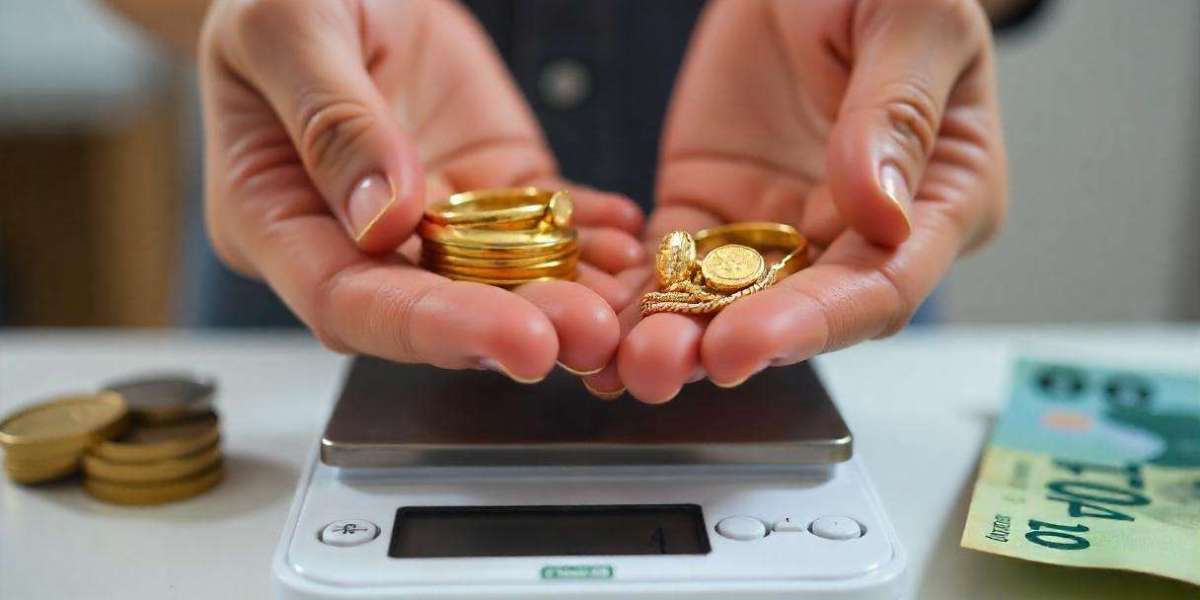Many people want to know: How much money can I get when I sell my gold? The answer depends on a few important things. If you’re looking for cash for gold in Australia, it’s good to understand what affects the price. This blog will explain the main factors that impact how much money you receive when you sell your gold jewellery, coins, or scrap gold.
By the end of this guide, you’ll be ready to sell smart and get the best value for your gold.
What Factors Affect the Price of Your Gold?
1. Gold Purity and Karat Value
Understanding Karats
Gold purity is measured in karats. Pure gold is called 24 karat (24K). But most jewellery is not pure gold. It is mixed with other metals like copper or silver to make it stronger.
24K = 100% pure gold
22K = about 91.6% pure
18K = about 75% pure
14K = about 58.3% pure
Higher karat gold means higher purity, and higher purity means more value.
How Purity Affects Price
The more pure your gold is, the more cash you’ll get.
Example:
If you sell 10 grams of 18K gold, you might get around $300.
For 10 grams of 14K gold, you may only get $230.
So, knowing the karat of your gold is very important when you want the best offer.
2. Weight of the Gold
Importance of Accurate Weighing
Gold is usually weighed in grams. The heavier your gold item, the more money you’ll get. Every gram counts, so it’s important to weigh your gold on a reliable digital scale.
Impact of Weight on Payout
Larger gold pieces or big collections will get more cash. But small items might not bring in much, especially if the buyer charges fees.
Tip: Clean your gold before weighing. Dust and dirt can reduce the total weight slightly.
3. Current Market Gold Prices
Real-Time Price Fluctuations
The price of gold changes every day. It is based on the international gold market. This is called the spot price of gold.
In October 2023, gold was around AUD 2,800 per ounce. But the price can go up or down based on:
World economy
Political events
Currency changes
How Market Prices Influence Your Payout
When the gold market is high, sellers get better prices. If the market drops, you may get less cash.
Tip: Check websites like ABC Bullion or Kitco for daily gold prices before you sell.
4. Condition and Presentation of the Gold
Appearance and Damage
Gold that looks clean and well-kept usually gets better offers. If your jewellery is bent, broken, or missing stones, buyers may offer less.
Testing and Verification Process
Buyers often test your gold before giving you a final price. They may use:
Acid tests
Electronic testers
XRF machines (for advanced accuracy)
This testing helps buyers know the exact purity and avoid scams. It also helps you get a fair price.
5. Type and Form of Gold Being Sold
Jewelry vs. Coins vs. Scrap Gold
Different forms of gold bring different prices.
Gold coins (like the Australian Kangaroo) are often close to pure gold and may carry extra value if they are rare or collectible.
Gold jewellery usually contains other metals, which lowers the price.
Scrap gold (broken chains, old rings, etc.) usually brings in the least unless it's high in karat.
Collectibility and Brand Recognition
If your gold is a branded item (like Tiffany & Co. or Cartier), or a rare coin, you might get more money.
Example: A 1970s Gold Kangaroo coin could sell for more than its gold value due to collector interest.
6. Gold Market Trends
Gold prices are affected by world events, like:
Inflation
War
Stock market changes
When people are worried about the economy, gold prices often go up because gold is a "safe investment."
Tip: Try to sell when prices are high. This can make a big difference in your final payout.
7. Market Demand in Australia
Sometimes, local demand also plays a role. If more people are buying gold in your area, buyers may offer more to keep up with the demand.
For example, before major festivals or holidays like Diwali or Christmas, jewellery buyers may pay slightly more for gold items.
Tips to Get the Most Cash for Gold in Australia
Research Current Gold Prices
Know the daily rate before you walk into a store.
Get Multiple Quotes
Don’t settle for the first offer. Visit at least 2–3 buyers.
Clean Your Gold
Presentation matters. Clean items look better and may weigh more.
Sell When Prices Are High
Watch the market for spikes in the gold price.
Know Your Gold’s Karat
Check the stamp or ask a jeweller to test it.
Real-World Example: Selling Gold at the Right Time
Sarah, from Sydney, had 50 grams of 22K gold jewellery. She wanted quick cash but waited until the market hit AUD 2,900 per ounce in early 2023.
She got quotes from 4 different buyers. The highest offer was AUD 4,500, while the lowest was only AUD 3,800.
Because she waited for the right time and did her research, she made $700 more than if she had sold it quickly.
Expert Insights: Advice from Australian Gold Buyers
“Always check if your buyer is licensed and transparent. Avoid those who don’t display daily gold rates or give unclear weight details.”
— Martin T., Melbourne gold buyer
“The best sellers are informed ones. Know your gold, know the price, and ask questions.”
— Anita J., Sydney-based jewellery appraiser
Conclusion
If you're planning to get cash for gold in Australia, it’s important to understand what affects your final payout. Key things include:
Gold purity (karat value)
Weight of your gold
Daily gold market prices
Condition and form of your gold
Local market demand and timing
With the right knowledge, you can avoid low offers and get the best deal for your gold.



